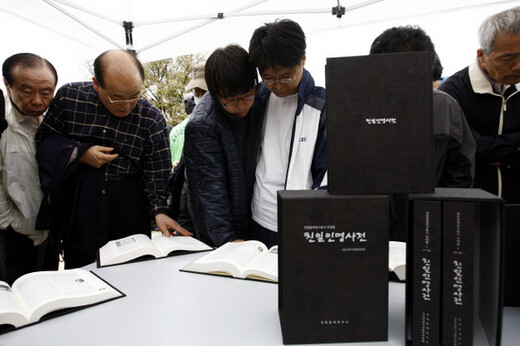hankyoreh
Links to other country sites 다른 나라 사이트 링크
Encyclopedia of Pro-Japanese figures has high impact, low distribution

By Park Tae-woo
Whenever this time of year comes around, attorney Lee Min-seok, 42, always remembers the events of two years ago, when the “Encyclopedia of Pro-Japanese Figures” was first published, presenting a record of the collaborationist activities of 4,389 people during the Japanese occupation.
At the time, Lee represented the Institute for Research in Collaborationist Activities (IRCA), which was on the receiving end of a request for an injunction banning publication. The suit had been filed by Park Ji-man, son of former President Park Chung-hee, who was listed in the encyclopedia as a collaborator. During the trial, Park Ji-man’s attorney argued that the Manchurian army was “different from the Japanese military because it was the military of the Manchurian state,” and that Park Chung-hee was “not a collaborator because the Manchurian army fought against the communist army.”
In response to the arguments, Lee spent all night translating evidence from Japanese and examining it to develop a rebuttal for the courtroom. On Nov. 6, 2009, the court dismissed Park’s injunction request, opening the way for the encyclopedia to reach publication on Nov. 8, two days after the ruling.
In addition to Park, surviving family members of journalist Chang Chi-yon and painter Chang Woo-sung filed suits against the IRCA before and after the publication, asking for injunctions to ban the inclusion of information, publication, or distribution. But apart from one instance where the IRCA accepted an explanation and did not list a name in the encyclopedia, all of the courts sided with the institute. In essence, the courts proved that the eight years of efforts by civil society and examination of huge amounts of historical data by researchers were not in vain.
Over the past two years, the encyclopedia has had a considerable impact on broadening awareness of the collaboration issue in South Korean society. Last month, Eumseong County in North Chungcheong decided to suspend budgetary support for a memorial effort for Lee Mu-yeong, a literary figure and collaborationist. The removal of statues of General Kim Baek-il in Geoje, South Gyeongsang Province, and former Chairman Kim Dong-ha at the Korea Racing Authority in Gwacheon, Gyeonggi, has been the subject of controversy. Last month, it emerged that around 76 collaborators are interred in the National Cemetery, with a campaign under way to amend the related legislation to have their remains relocated.
In spite of these accomplishments, the encyclopedia’s distribution has failed to live up to initial expectations. The IRCA worked to distribute the text, with all proceeds to be used for the building of a “citizens’ history center for the practice of historical justice,” and civic and social groups have held donation campaigns over the past two years, but just 4,500 sets have been donated or sold. Distribution is particularly low at public libraries, with only 223 of the country’s 687 public libraries, or about 32%, housing sets of the encyclopedia.
“To establish a proper historical view, South Koreans need to be as aware of the actions of pro-Japanese collaborators as they are of independence activists,” said IRCA Secretary General Bang Hak-jin. “It is very unfortunate that public libraries have been so unwilling to acquire the encyclopedia.”
In honor of the second anniversary of publication, the IRCA plans to hold a symposium on “achievements and tasks in the compilation of the ’Encylopedia of Pro-Japanese Collaborators‘” on Nov. 25 at Chungmu Art Hall in the Heungin neighborhood of Seoul’s Central District.
IRCA Executive Director Cho Se-yeol said, “The publication of the encyclopedia is an achievement in the 20th century South Korean intellectual history, with civil society’s hope for democracy and the pursuit of universal human values in human rights, peace, ethnicity, and religion.”
“We plan to work toward a proper reckoning with the collaborationist legacy through future research and writing work, including the publication of a revised and expanded edition of the encyclopedia,” Cho added.
Please direct questions or comments to [englishhani@hani.co.kr]
Editorial・opinion
![[Column] Park Geun-hye déjà vu in Yoon Suk-yeol [Column] Park Geun-hye déjà vu in Yoon Suk-yeol](https://flexible.img.hani.co.kr/flexible/normal/500/300/imgdb/original/2024/0424/651713945113788.jpg) [Column] Park Geun-hye déjà vu in Yoon Suk-yeol
[Column] Park Geun-hye déjà vu in Yoon Suk-yeol![[Editorial] New weight of N. Korea’s nuclear threats makes dialogue all the more urgent [Editorial] New weight of N. Korea’s nuclear threats makes dialogue all the more urgent](https://flexible.img.hani.co.kr/flexible/normal/500/300/imgdb/original/2024/0424/7317139454662664.jpg) [Editorial] New weight of N. Korea’s nuclear threats makes dialogue all the more urgent
[Editorial] New weight of N. Korea’s nuclear threats makes dialogue all the more urgent- [Guest essay] The real reason Korea’s new right wants to dub Rhee a founding father
- [Column] ‘Choson’: Is it time we start referring to N. Korea in its own terms?
- [Editorial] Japan’s rewriting of history with Korea has gone too far
- [Column] The president’s questionable capacity for dialogue
- [Column] Are chaebol firms just pizza pies for families to divvy up as they please?
- [Column] Has Korea, too, crossed the Rubicon on China?
- [Correspondent’s column] In Japan’s alliance with US, echoes of its past alliances with UK
- [Editorial] Does Yoon think the Korean public is wrong?
Most viewed articles
- 1[Column] Park Geun-hye déjà vu in Yoon Suk-yeol
- 2N. Korean hackers breached 10 defense contractors in South for months, police say
- 3Will NewJeans end up collateral damage in internal feud at K-pop juggernaut Hybe?
- 4Kim Jong-un expressed ‘satisfaction’ with nuclear counterstrike drill directed at South
- 5[Editorial] New weight of N. Korea’s nuclear threats makes dialogue all the more urgent
- 6[Cine feature] A new shift in the Korean film investment and distribution market
- 7[Column] ‘Choson’: Is it time we start referring to N. Korea in its own terms?
- 8[Column] The clock is ticking for Korea’s first lady
- 9[Editorial] Japan’s rewriting of history with Korea has gone too far
- 10Thursday to mark start of resignations by senior doctors amid standoff with government